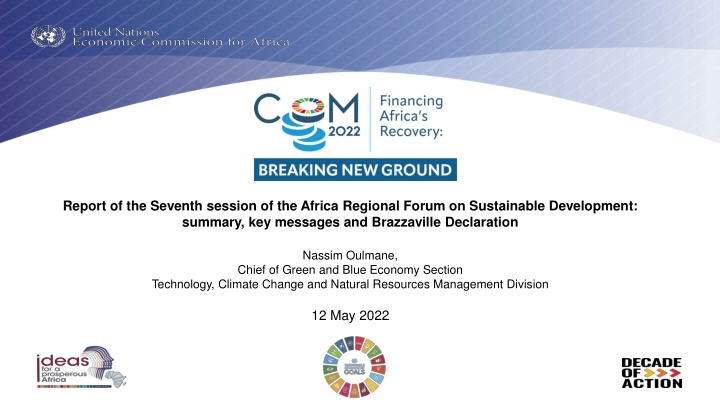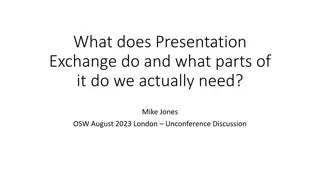
Key Outcomes of Africa Regional Forum on Sustainable Development - ARFSD-7 Summary 2022
The Seventh Session of the Africa Regional Forum on Sustainable Development (ARFSD-7) focused on building a resilient and green Africa to achieve the 2030 Agenda and Agenda 2063. Key outcomes included consensus on the Brazzaville Declaration, sharing of experiences, strengthening capacity in African countries, launching the Africa Artificial Intelligence Research Centre, and enhancing domestication of SDGs. The forum provided regional input to the 2021 HLPF and emphasized the importance of national and local action for sustainable development.
Download Presentation

Please find below an Image/Link to download the presentation.
The content on the website is provided AS IS for your information and personal use only. It may not be sold, licensed, or shared on other websites without obtaining consent from the author. If you encounter any issues during the download, it is possible that the publisher has removed the file from their server.
You are allowed to download the files provided on this website for personal or commercial use, subject to the condition that they are used lawfully. All files are the property of their respective owners.
The content on the website is provided AS IS for your information and personal use only. It may not be sold, licensed, or shared on other websites without obtaining consent from the author.
E N D
Presentation Transcript
Report of the Seventh session of the Africa Regional Forum on Sustainable Development: summary, key messages and Brazzaville Declaration Nassim Oulmane, Chief of Green and Blue Economy Section Technology, Climate Change and Natural Resources Management Division 12 May 2022
Overview of the Seventh Session of ARFSD Held in hybrid format from 1-4 March 2021, in Brazzaville - Hosted by the Government of Republic of Congo under the Patronage of HE President Denis Sassou-Nguesso ARFSD-7 (2021) Held in preparation for the 2021 HLPF that took place in New York, 6-15 July 2021 Theme: Building forward better: Towards a resilient and green Africa to achieve the 2030 Agenda and Agenda 2063 Reviewed 9 selected SDGs (1, 2, 3, 8, 10, 12, 13, 16 & 17) and corresponding goals of Agenda 2063 Organized by ECA with Government of Republic of the Congo, AUC, AfDB and United Nations System Forum had High-level dialogue, plenary and parallel segments; and co-organized workshops and side events on/for VNR, VLRs, major groups Key Events associated with ARFSD-7: Africa RCP 2, Third Africa STI Forum; Launch of ECA report on Building Forward for an African Green Recovery & Regional Dialogue on African Food Systems Thematic and SDG Focus Partnerships & main Activities during the Forum
Key outcomes of the Forum (ARFSD 7) 4 3 2 Consensus on and adoption of Brazzaville Declaration and Key policy options for implementation action at national, regional and global level 1 Member states learned and shared experiences, approaches, good practices to accelerate the implementation of the two Agendas Strengthened capacity and support to 10 African countries, and subnational governments to conduct voluntary national and local reviews and present at the 2021 HLPF MOU and launch of Africa Artificial Intelligence Research Centre in Brazzaville Leveraging Artificial Intelligence for sustainable development in Africa Scaling up domestication of SDGs and bolstering national and local action to achieve SDGs and Goals of Agenda 2063 With focus on the selected 9 SDGs (1, 2, 3, 8, 10, 12, 13, 16 & 17 ) Africa s regional input to 2021 HLPF
ARFSD7 Key messages and call for action by Member States and partners 1. African Union Commission, ECA and partners should explore and strengthen capacity of member states to access various sources of financial resources 2. Targeted support should be provided for protecting the Congo Basin, including the conservation of its peatland. Development partners to mobilize financing to capitalize the Blue Fund for the Congo Basin. 3. Digitalization in the health sector must be leveraged 4. Member States should align their national development strategies with the African Continental Free Trade Area (AfCFTA) process and leverage its opportunities 5. Member States must provide adequate resources to strengthen their disaggregated data collection and use 6. Member States should adopt decisive public policies including employment-intensive policies and green investments to build forward better 7. Streamline delivery modalities of the United Nations system: engage CSO and private sector 8. Countries should conduct inclusive, participatory and forward-looking voluntary national and local review on the implementation of SDGs and Agenda 2063
Synopsis and key outcomes of ARFSD-8 (2022 ARFSD) 3 1 2 4 Adoption and launch of key initiatives to drive implementation: (i) MOU on Carbon pricing and credits (ii) Alliance of Entrepreneurial Universities in Africa (iii) Technology Development and transfer Network in Rwanda Support and strengthened capacity for: (i) 21 African countries for VNRs (ii) Cities and other subnational Govts for VLRs (ii) CSO, Private Sector, Academia and Parliamentarians Member states learned and shared experiences, approaches, good practices to accelerate the implementation of the two Agendas Consensus reached on Kigali declaration and Key policy options for implementation action at national, regional and global level With focus on the selected 5 SDGs (4, 5, 14, 15, and 17) Africa s regional input to 2022 HLPF
ARFSD8 Key messages and call for action by Member States and partners 1. 2. African countries should invest in developing more resilient education systems Strengthen institutional arrangements, to enhance national ownership and responsibility for the effective implementation, monitoring and accountability of the gender-related goals and targets African countries to strengthen their institutional capacity for marine resources management and support the Great Blue Wall initiative African countries and their development partners to strengthen the capacity of the region to incorporate and increase investment in biodiversity and land management UN, African Union Commission, the African Development Bank and other partners to strengthen the capacity of African countries to leverage the Liquidity and Sustainability Facility and other innovative financing mechanisms ECA and the United Nations system should help to establish a truly developmental carbon market on the continent. Member states and partners to strengthen integration of SDGs and Agenda 2063 in national and sectoral plans and policies. Scaleup investments in the generation and use of quality statistics 3. 4. 5. 6. 7. 8.
THANK YOU! Follow the conversation: #COM2022 More: www.uneca.org/cfm2022






















